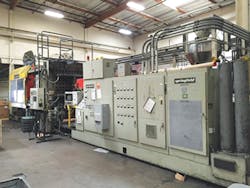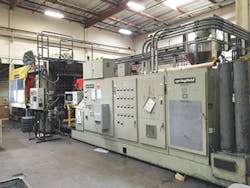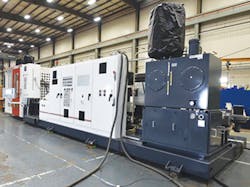Older low-pressure injection molding (LPIM) machines are being born again as Milacron takes its refurbishing service to new levels. The company has seen rising interest in updating older LPIM machines — purchased in the 1980s and 1990s — and is expanding its capabilities to meet the demand.
"Essentially, we are upgrading machines that have been in production for over 30 years and bringing them up to the same specifications as our new machines," said Eric Hallstrom, business manager for LPIM technologies at Milacron. "This has been especially popular since we started to promote this capability to our customers, as they see a significant-enough savings since we are reusing the most expensive parts of these large machines, being the bases, platens and cylinders. The customer gets back a machine that outperforms the machine's original specifications and is as reliable as a new machine, with the same warranty."
Depending on the options a customer chooses, the cost of fully refurbishing an older machine is about 70 percent to 80 percent of the price of a new machine.
Milacron starts the renewal process on older machines by tearing them down and conducting a full inspection. It refurbishes platens and installs a laundry list of new components, including screws, barrels, injection melt accumulators, controls, electrical systems and hydraulics. Milacron replaces DC motors and drives with more energy-efficient AC drives. Machines may also be repainted. Milacron sends out injection cylinders and hydraulic accumulators for refurbishment and resealing. The timeline on a rebuild can vary, but the process includes about eight to 10 weeks for engineering. After that, the machine can be sent to Milacron's facility in Batavia, Ohio, where it undergoes 26 to 30 weeks of build time.
LPIM machines are ideally suited to the production of large, lightweight, durable structural plastic parts, Hallstrom said. Parts include materials-handling products, such as pallets and boxes; underground enclosures for telecommunications and utilities, drainage and irrigation products; components for all-terrain vehicles; and commercial/institutional and industrial safety products. Products previously made from concrete, metal and wood for the building and infrastructure market are being reimagined as LPIM plastic parts, he said. Large, lightweight parts with a high-quality surface can be produced.
Depending on the application, LPIM machines can be used to perform structural foam, structural web, gas-assisted or solid-part molding; they can also perform some combinations of these technologies to produce parts.
As part of the LPIM process, a foaming agent, typically nitrogen, is mixed with the polymer melt in the machine barrel, then short-shot into the mold through Milacron's modular multiple-nozzle system. This allows the expanding gas/polymer cellular mixture to fill the mold cavity. LPIM technology creates a part with a cellular foamed core that is encapsulated by a solid non-foamed skin of material, resulting in a rigid structure.
The hot-runner manifold and nozzle system are integrated into the machine for seamless operation, control and repeatability. The multi-nozzle design allows similar- or different-sized parts to be produced at the same time on multiple molds for greater productivity.
Compared to conventional molding, the technology requires one-twentieth to one-tenth of the clamping pressure and mold cavity pressure. This permits the use of lower-cost aluminum molds. The process can reduce part weights up to 20 percent and creates a product with low internal stresses, which can replace many types of rotational molded or industrial blow molded parts. Parts produced in this way look better, and the machines can achieve higher throughputs with faster cycle times, Hallstrom said.
At NPE2018, Milacron touted its refurbishment program with a display about its partnership with 20/20 Custom Molded Plastics, a molder of large structural parts. Milacron announced that it will fully refurbish and upgrade eight LPIM machines at 20/20. This includes two machines with 400 tons of clamping force that will be upgraded to 500 tons of clamping force. An LPIM machine with 500 tons of clamping force will be upgraded to 750 tons of clamping force. In addition, five other Milacron LPIM machines at the company, each with 750 tons of clamping force, will be refurbished and upgraded, but Hallstrom said the clamping tonnage will remain unchanged when the machines are rebuilt. Milacron will also refurbish four standard high-pressure injection molding machines at 20/20.
"We also had Milacron integrate some proprietary technologies into their machines that allow us to have the most versatile LPIM structural foam fleet in the custom molding market," 20/20 President Ron Ernsberger said.
These improvements include using independent nozzle control, which wasn't available when the LPIMs were originally built, and replacing obsolete controls with new controls from B&R Industrial Automation Corp., Roswell, Ga.
20/20 operates a state-of-the-art 135,000-square-foot facility in Holiday City, Ohio. Its machinery lineup allows for the production of single parts weighing up to 200 pounds. The company also assists with mold design and tool making, and offers many parts-finishing services, including secondary component assembly and machining, drilling and tapping, hot stamping, labeling, sonic welding, specialized packaging and direct shipping.
Mikell Knights, senior staff reporter
Contact:
Milacron LLC Batavia, Ohio, 513-536-2000,


